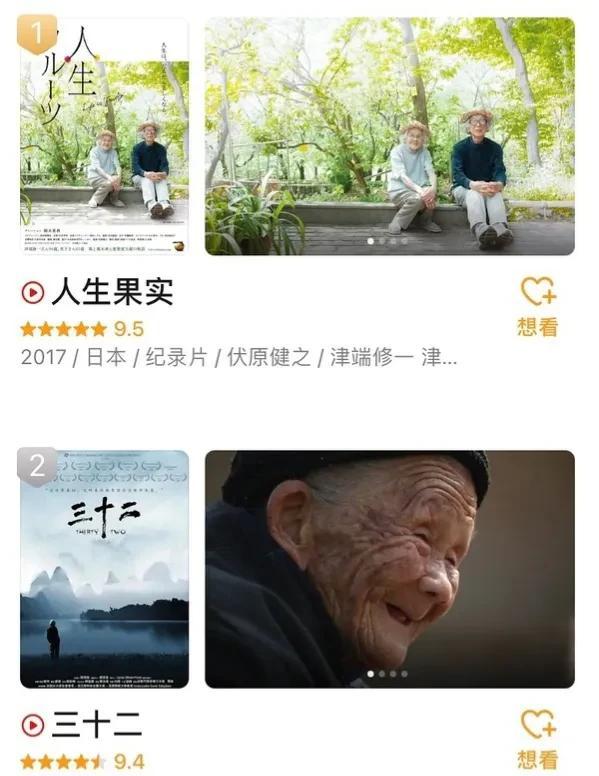Since mid-August, some Japanese movie scoring entries on Douban have poured in a large number of one-star bad reviews, and the ratings of some films have taken a sharp turn.
Especially on August 17, a documentary suddenly soared to the first place in the Douban hit movie, and the popularity remained high until the official shot.
This film is the Japanese documentary "Fruits of Life", which once had a high score of 9.6 points, which previously entered the Douban movie top250 and was praised as a classic, and the current rating has dropped to 8.7 points.

What really happened during this time?
On the surface, the content of this documentary is very harmless to people and animals, but it is about the idyllic life of an elderly Japanese couple, three meals and four seasons, warm and warm, similar to "Little Forest, Winter and Spring".
The fuse of the incident is one of the protagonists in the film, Shuichi Tsubata, who was pointed out by netizens to have participated in World War II and was a naval fighter designer.
A stone stirred up a thousand waves, so a large number of one-star began to pour into Douban, supporters and opponents began to argue, and five stars and one star began to fight.
The focus of public opinion controversy lies in two points. First, whether the protagonist of this documentary, Shuichi Tsubata, is a warrior fan. Second, whether this documentary promotes the tendency to glorify war. But if it sticks to a little, this documentary should be boycotted.
According to Wikipedia, Shuichi Tsubata was born in 1925 and was 12 years old when the Sino-Japanese War broke out in full swing in 1937. In 1945 he was assigned to Atsugi Airfield as a naval engineer. In August of the same year, Japan surrendered in defeat and the army was disbanded.
Strictly speaking, Tsubata served in the navy for less than eight months, and was in the technical department. He had never been to the front, let alone to China, but was a Japanese soldier who had fought in World War II.
So does this documentary promote the idea of glorifying war?
Yes, but it was deleted.
This is the biggest reason why this documentary has been attacked.
Because it really deserves it.
Everyone now goes to the video website to watch the "Fruits of Life", at first glance there is no problem, it is indeed about some pastoral life. But this is not actually the full version of the movie, but it has been cut by 6 minutes, and the mystery is hidden in these 6 minutes.
During these 6 minutes, the following scene appeared:
1. Gave the Qingtian White Flag a large and extra long close-up. There is also a fighter model picture in front of the close-up, which is very ambiguous.
2. Shuichi Tsubata went to tai to visit his comrades-in-arms, and sang the tai army military song happily during the banquet, plus the last time in front of Chen Qingshun's tomb, the entire film tai military song appeared a total of three times.
The Bay people who gathered with the male protagonist were probably pilots who were attracted to the Japanese Navy Yard to build fighters in 43-45 years by excellent conditions, and they also huddled together after returning to Tai, extremely pro-Japanese.
In summary, we can say that there is no problem with Shuichi Tsubata's identity, but he himself is definitely not anti-war, and even misses that period of war.
Ninety-somethings still sing tai military songs, not to mention the crooked ass, absolutely anti-war defeat, such a movie hit a star what?! This is a matter of principle.
Of course, this "one-star movement" also affected the Douban entries of other Japanese movies. For example, Miyazaki's cartoons "Porco Rosso" and "The Wind Rises" and Nagisa Oshima's famous work "Merry Christmas on the Battlefield" have also received many bad reviews.
Attacking Hayao Miyazaki is a bit excessive, and Osamu Tezuka, Hayao Miyazaki, Fujiko Fujio, and Haruki Murakami are all well-known anti-war activists. Some people blindly expand the scope and will only "make friends gone and make many enemies." ”
This is undesirable and needs to be corrected.
As for the idea of netizens who hold an opposing attitude, they can actually understand that they only want to simply watch movies, and as for things other than movies, they don't want to care about movies and other hooks, so they are particularly disgusted with amplification, especially a stick to kill a movie.
But what I want to say is that movies are never just movies, and if movies are just movies, where is the cultural invasion?
Just like the three principles of manga proposed by the famous Japanese manga artist Osamu Tezuka, that is, when creating manga works, authors must not violate three principles that must be observed:
1. Don't joke about the victims of war or disaster;
2. Do not show contempt for certain occupations;
3. Don't joke about the nation, the people, or the masses.
When "The Fruit of Life" does hit the bottom line, no matter how good a movie it is, it should be boycotted. And it turns out that "The Fruit of Life" has indeed touched the bottom line, so please stop the opponents and let the real documentaries "Thirty-Two" and "Twenty-Two" get the publicity they deserve.